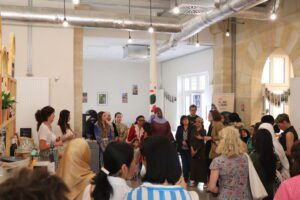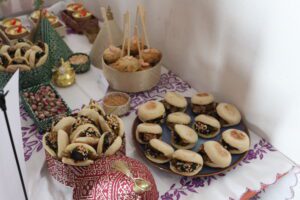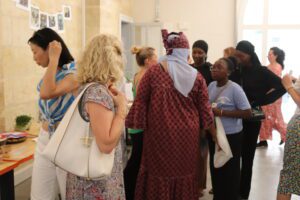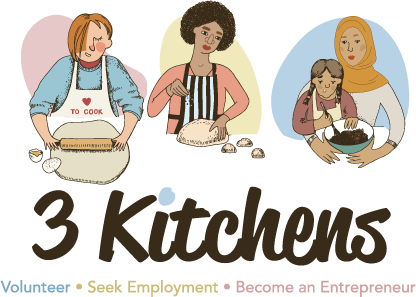Showcasing stories, outcomes, and future pathways for migrant women in food entrepreneurship
The final transnational meeting of the 3 Kitchens project took place in Bordeaux, France, on 17–18 June 2025 in the run-up to World Refugee Day. Hosted by Marie Curry and Le LABA, the two-day event brought together project partners, adult educators, migrant women and community workers who had participated directly in the programme.
The aim of the event was twofold: to share the outcomes of the project, including the educational tools developed over the three years and to put the spotlight on the voices of the migrant women whose lived experience shaped its direction and impact.
Day 1: Hybrid Educational Conference – 17 June 2025
The first day was structured as a hybrid conference, livestreamed from Krokom Town Hall in Sweden and Le Laba offices in Bordeaux, attended online and in person by stakeholders across all four partner countries. This format allowed for both local grounding and international exchange. The conference featured:
- A full presentation of the 3 Kitchens educational framework (Volunteering, Employment, Entrepreneurship)
- Reflections from educators and coordinators on delivery, adaptation, and local context
- Contributions from migrant women who shared how the training had influenced their goals, learning journeys, and decision-making. One of the most impactful contributions came from Funke Egberongbe, speaking live from Ireland. Funke, who arrived in Ireland as an asylum seeker, shared her progression from volunteer cook to entrepreneur and restaurant owner. Her story spoke candidly to the realities of starting over in a new country — and the courage it takes to build something from scratch. Her testimony received strong responses from participants across multiple countries, affirming the importance of visibility, role models, and continued support.



Day 2: In-Person Showcase and Community Celebration – 18 June 2025
The second day was hosted by Marie Curry on-site at La Manuco in Bordeaux, creating space for more informal interaction between migrant women, local supporters, and the 3 Kitchens project team. The programme included:
- Cultural food tastings and displays
- Peer learning exchanges
- Reflections from local participants on how they had applied the training in real contexts
- A spoken-word contribution by Eduardo Berti, who had live captured with the stories of several participants to develop a literary view of the themes of identity, migration, and transmission through food. It must be read
There was no stage or spotlight, just conversation circles. For many, this gathering marked the first time they had publicly shared their ideas, recipes, or plans with others outside their immediate circles.


Conclusion
Across both days, what emerged most clearly was the value of sustained, localised support structures for migrant women and the central role of food as a catalyst for connection, confidence, and change. Food was the focus of the 3 Kitchens project; it was the entry point. Through cooking, sharing, and storytelling, women were able to reclaim space, build relationships, and imagine new futures. At the heart of the project were the three kitchens:
- the Volunteering Kitchen, where migrant women first built confidence and connections in their new communities;
- the Employment Kitchen, which offered skills-based training and mentoring to help them access the labour market;
- and the Entrepreneurship Kitchen, where women explored the possibility of starting small food businesses rooted in their culture and creativity.
Together, these kitchens offered a holistic, low-barrier pathway that respected different starting points and ambitions.
The Bordeaux event reinforced the importance of programmes that are flexible, multilingual, and grounded in real experience. 3 Kitchens offers downloadable, ready-to-use learning resources in four languages. But more importantly, it creates permission and pathways for migrant women to take concrete steps, whether toward community volunteering, paid work, or self-employment with their own ingredients, traditions, and ambition.
What stands out is that the Bordeaux event did not attempt to tie a neat bow around complex lives. Instead, it created a respectful and open space where voices could be heard, food could be prepared and shared, and futures could be imagined, not as abstract goals, but as practical steps grounded in solidarity, skill, and community.
Eduardo Berti Production (202 downloads )